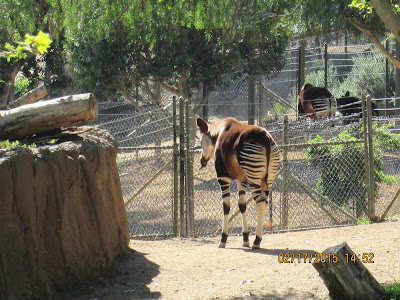Thursday, October 6, 2016
Saturday, February 7, 2015
fun facts about okapis
Photo: Elizabeth Whitman
- The sounds okapis make are,"chuff'" (when they greet each other),"bleat" (baby okapis some times bleat to their mothers) and they also "moo".
- Okapi's scientific name is Okapi Johnstoni.
- They are also called the forest giraffe, or zebra giraffe.
- Male okapi's territories are bigger than a females territory.
- The okapi was once called the African unicorn
- they will lick clay near river banks to get important minerals. They will also eat charcoal off burnt trees for the same reason.
- nobody knows why, but some times calves will not poop till they are about ten weeks old
Friday, February 6, 2015
life cycle of the okapi
Photo from Denver Zoo / Dave Parsons
- Okapis can live from 25 years to 30 years
- Their only predator besides man is the leopard
- There are only about 10,000 okapis in the wild
- The gestation period is 14 months
- Mothers groom their calves
- After abut 9 months, a calf is a little more independent, but still stays near his mother
Thursday, February 5, 2015
what okapis eat
Photo: Okapi Conservation Project
Okapis have long purple tongues. They use their long tongues to eat leaves off of tall trees. When they drink water, they spread their legs and bend down their necks. The food they eat is too hard for their teeth, so they swallow their food whole, then later they regurgitate it back up, and eat the cud because the cud is softer on their teeth.
Okapis eat tree leaves, buds, grasses, ferns, fruits, hawthorn leaf, and fungi. Okapis are herbivores.
Wednesday, February 4, 2015
an okapi's body
Photo: San Diego Zoo
- Okapis have split (cloven) hooves
- Their tongues are 18 inches long
- They clean their eyes with their tongues
- Males have two fur covered horns called "ossicones"
- Each okapi has a different stripe pattern
- At the bottom of their legs, it is just white, like a sock
Tuesday, February 3, 2015
okapi's habitat
In the wild, okapis live in the Ituri Rain Forest in the Democratic Republic of the Congo in Africa. The Okapi Wildlife Reserve is there. It takes up 20% of the Ituri Rain Forest. Other animals that live there are, elephants, primates, forest pigs, antelope, forest buffalo, and over 500 species of butterflies.
In captivity, they live in the San Diego Zoo, Dallas Zoo, Houston Zoo, Columbus Zoo and Aquarium, Disney's Animal Kingdom, Denver Zoo, and Saint Louis Zoo.
Subscribe to:
Comments (Atom)
Pictures of okapis at the San Diego Zoo Safari Park
These are pictures I took at the Safari Park, which owned by the San Diego Zoo.

-
Photo from Denver Zoo / Dave Parsons Okapis can live from 25 years to 30 years Their only predator besides man is the leopard There a...
-
These are pictures I took when I was at the San Diego Zoo. The okapis there were really nice.
-
These are pictures I took at the Safari Park, which owned by the San Diego Zoo.




















